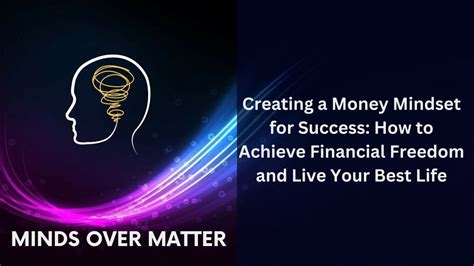The Fickle Nature of Motivation
Many of us embark on journeys towards financial stability or physical health fueled by a burst of motivation. We set ambitious goals: save X amount by year-end, lose Y pounds in a month, hit the gym five times a week, or stick to a strict budget. While initial motivation can be a powerful catalyst, its nature is inherently ephemeral. It waxes and wanes, often disappearing when faced with the first obstacle, a bad day, or simply the daily grind. This is where the common cycle of starting strong and then falling off track begins.
True, sustainable discipline isn’t built on the peaks of motivation, but rather in the valleys when motivation is scarce. It requires a fundamental shift in how we approach our goals and ourselves. It’s about cultivating a mindset that acts independently of fleeting feelings, focusing instead on deeper principles that anchor our behaviors.

Shifting from Goals to Identity
One of the most profound mindset shifts for lasting discipline is moving from outcome-based goals to identity-based habits. Instead of saying, “I want to save $10,000” or “I want to run a marathon,” consider who you need to become to achieve those things. The question transforms into: “What would a financially responsible person do?” or “What would an athlete do?” When you identify as a saver, an investor, or a healthy individual, your actions become a reflection of your identity, not just a means to an end. This internal shift makes choices like opting for a home-cooked meal over takeout or automatically transferring funds to savings feel less like a chore and more like a natural expression of who you are.
Embracing the Process, Not Just the Outcome
Our society often celebrates the outcome – the finished novel, the massive investment portfolio, the shredded physique. However, the path to these outcomes is paved with consistent, often unglamorous, daily processes. A mindset geared for lasting discipline understands that mastery isn’t about grand gestures but about the relentless accumulation of small, consistent actions. In fitness, it’s showing up for that workout, even when tired, and focusing on proper form. In finance, it’s consistently tracking expenses, automating savings, and making mindful spending choices. This process-oriented mindset fosters patience and resilience, teaching us that small, incremental improvements compound over time to create significant results.

Cultivating Patience and Delayed Gratification
In an age of instant gratification, developing the mental muscle for delayed gratification is critical. Both financial and fitness discipline demand sacrificing immediate pleasure for long-term gain. This mindset understands that the pleasure of a new gadget today might compromise financial freedom tomorrow, or that skipping a workout for immediate comfort might delay health goals. It’s about consciously choosing the harder, more beneficial path in the present, knowing that the rewards, though distant, are far more substantial and fulfilling. This isn’t about deprivation, but about intentional choice rooted in a clear vision of your future self.
Resilience and Self-Compassion in the Face of Setbacks
No journey towards discipline is linear. There will be missed workouts, overspending days, and moments of doubt. A critical part of a resilient mindset is the ability to bounce back without self-sabotage. Instead of an ‘all-or-nothing’ mentality where one misstep derails the entire effort, a disciplined mindset embraces self-compassion. It acknowledges the setback, learns from it, and gently steers back on track without dwelling on guilt or shame. It’s about viewing missteps as data points for learning, rather than definitive failures that signal the end of the journey.

Architecting Your Environment for Success
While an internal shift is paramount, a disciplined mindset also recognizes the power of external influences. It proactively designs an environment that supports desired behaviors and makes undesired ones more difficult. For financial discipline, this might mean automating savings, unsubscribing from marketing emails, or having a clear budget visible. For fitness, it could be laying out gym clothes the night before, meal prepping healthy food, or finding an accountability partner. This proactive environmental design reduces the need for willpower in the moment, making consistent action the path of least resistance.

The Power of a Growth Mindset
Underpinning all these elements is the fundamental belief in a growth mindset. This is the conviction that your abilities and intelligence can be developed through dedication and hard work, rather than being fixed traits. When applied to financial and fitness discipline, it means believing that you can learn to manage money better, that your body can become stronger or healthier, and that setbacks are opportunities for growth, not proof of inherent limitation. This belief fuels persistence and makes the effort feel worthwhile.

Conclusion
Lasting financial and fitness discipline transcends fleeting motivation; it is forged in the crucible of a deliberate and cultivated mindset. By shifting from external goals to internal identity, embracing the power of consistent processes, practicing delayed gratification, fostering resilience, strategically designing our environments, and adopting a growth mindset, we build an internal framework that sustains positive behaviors long after the initial motivational spark has faded. This isn’t just about achieving goals; it’s about transforming who we are, one disciplined choice at a time.




